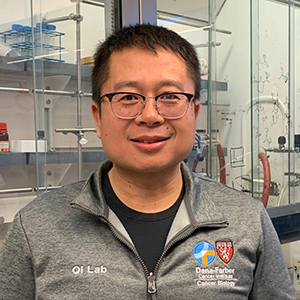Research We Fund
With hundreds of projects currently underway, we fund scientists through our academic grant programs and biotech partners through our strategic venture philanthropy initiative. Use the filters below to find an LLS-funded project.
For a better viewing experience, please use a larger device.
Genomic and epigenomic interactions of complex structural variants affecting outcome in multiple myeloma
Multiple myeloma is characterized by severe changes in chromosomes that result in gains or losses of genetic material. Several key events disrupt the genome of myeloma cells and are important in defining poor patient outcome, but the biological mechanisms of how they cause high-risk disease is not known. We will perform comprehensive genomic studies, involving six different cutting-edge techniques, to examine the interactions of these high-risk events and identify the mechanisms leading to them.
Program: DiscoveryProject Term: Start Date: October 1, 2024 End Date: September 30, 2027
Targeting aberrant epigenetic condensates in myeloid malignancies
Genetic changes of ASXL1 are very frequent in human blood cancers. We found that the altered forms of ASXL1 protein promote blood cancers through forming tiny liquid-like droplets in the cell. In this project, we aim to develop a method to specifically break these droplets to inhibit its activity in driving blood cancers.
Program: DiscoveryProject Term: Start Date: October 1, 2024 End Date: September 30, 2027

Craig Jordan, PhD
University of Colorado Denver, Anschutz Medical Campus
Aurora, ColoradoModeling LSC heterogeneity at unprecedented resolution in AML
Our goal is to perform high-resolution molecular characterization of human leukemia stem cells (LSCs). We have developed an integrated set of single-cell techniques that will assess transcriptional, genomic, and phenotypic features of primary LSC populations obtained from patients undergoing varying forms of treatment. We expect to create a molecular atlas of primary LSCs that will provide the leukemia research community with a powerful resource for the development of improved therapies.
Program: DiscoveryProject Term: Start Date: October 1, 2024 End Date: September 30, 2027
Targeting Microenvironment Determinants in Peripheral T-cell Lymphoma
Peripheral T-cell lymphomas are highly aggressive blood cancer that have very poor survival rate, highlighting the need for new therapies to improve patient survival. We aim to improve our understanding of the characteristics of the individual cancer cells and their interaction with surrounding cells in the tumor environment with the goal of identifying new drugs that we can validate in preclinical models and move into more efficient treatments for lymphoma patients.
Program: DiscoveryProject Term: Start Date: October 1, 2024 End Date: September 30, 2027
Defining mechanisms of sensitivity and resistance to PI3K gamma inhibition in AML
The goal of our laboratory is to discover, study, and the translate new leukemia therapies to the clinic. In this project, we are studying a signaling pathway, called PI3 kinase gamma, that we believe is important in patients with AML and might lead to new treatments using drugs that target its activity.
Program: DiscoveryProject Term: Start Date: October 1, 2024 End Date: September 30, 2027
Interrogating T-cell apoptotic priming to improve CAR-T persistence in treatment of lymphoid malignancies
CAR-T cells are made from a patient’s own immune cells, altered so that they specifically recognize and kill the patient’s cancer cells. They are effective in many but not all cases of B-acute lymphoblastic leukemia (B-ALL) and diffuse large B-cell lymphoma (DLBCL), among other blood cancers. In this proposal we seek to better understand ways to select T cells that will make better CAR-T cells as well as to treat CAR T cells them in ways to make them work better in the cancer patient.
Program: DiscoveryProject Term: Start Date: October 1, 2024 End Date: September 30, 2027
Dissecting the mitochondrial alterations by aberrant NPM1 to the pathogenesis of myelodysplastic syndrome
Survival rates for those afflicted with MDS have not improved despite extensive effort to identify the key genetic events in its pathogenesis. This project elucidates the contributions of aberrant NPM1 to hematological disorders, with a focus on mitochondrial fitness and inflammasome activation. The resulting insights into the metabolic, genetic and proteomic requirements of homeostasis that are critical to preventing aging will have a major impact on the treatment of hematological malignancies.
Program: DiscoveryProject Term: Start Date: October 1, 2023 End Date: September 30, 2026
Predicting progression in myeloproliferative neoplasm patients by reconstructing the history of disease in each patient
Blood cancers called myeloproliferative neoplasms occur when one of the blood stem cells picks up a mutation. Some patients stay in the chronic phase of the disease for years whereas others rapidly progress with poor outcome. We recently measured when the cancer mutation first occurs and the rate of expansion of the cancer cells in individual patients. We will develop a method that uses the history of disease in each patient to identify those that are at risk of progression.
Program: DiscoveryProject Term: Start Date: October 1, 2023 End Date: September 30, 2026
Genomics of Diffuse Large B Cell Lymphoma: pervasive role of super-enhancer hypermutation in dysregulating oncogene expression
We recently identified a pervasive, pathogenically relevant mutational mechanism that targets super-enhancers (SE) in DLBCL, leading to target gene deregulation. Here we will dissect the mechanistic role of 3 highly recurrent hotspots in the BCL6, BTG2 and CXCR4 SEs in driving lymphomagenesis and tumor dependency in vitro and in vivo using novel mouse models. These studies will significantly transform our understanding of DLBCL and identify novel therapeutic targets.
Program: DiscoveryProject Term: Start Date: October 1, 2023 End Date: September 30, 2026
Targeting metabolic reprogramming in MDS and AML stem/progenitor cells
Myelodysplastic neoplasms are malignant disorders driven by expansion of diseased hematopoietic stem cells and progression to leukemia. Our investigations have identified the important role of the transporter of amino acid glutamine SLC38A1 in sustaining metabolic demands of rapidly growing malignant stem cells. The goal of this project is to genetically target this transporter to understand its role on tumorigenesis and progression; and to develop SLC38A1 inhibitors as novel therapeutic tools.
Program: DiscoveryProject Term: Start Date: October 1, 2023 End Date: September 30, 2026
Functional dissection of heterogeneity of responses to CAR T cells using Spatiotemporal Image-guided Genomic and Cellular Analysis (SaGA) in myeloma
Despite remarkable progress in the last 20 years, multiple myeloma remains an incurable disease. In recent years, 2 CAR T cell products that target BCMA on the myeloma cell have been approved. These products result in remarkable initial responses however the duration of these responses has been disappointing. In this proposal, we will take a novel approach to isolate and characterize myeloma cells that interact with CAR T cells but are not killed by them as a potential resistance mechanism.
Program: DiscoveryProject Term: Start Date: October 1, 2023 End Date: September 30, 2026
Molecular Pathogenesis and Therapeutic Targets for Transformed Marginal Zone and BN2 Lymphomas
This project is the first to explore the origin of a newly discovered type of lymphoma called “BN2-DLBCL”. Mutations in a gene called “SPEN” are a defining feature of these tumors. Strikingly, SPEN mutations are more common in females and cause more deadly disease. Our proposal will reveal for the first time how these tumors originate from the immune system, how they are intimately linked to autoimmune disorders such as Lupus, why they occur preferentially in women, and how to cure them.
Program: Discovery
Project Term: Start Date: October 1, 2022 End Date: September 1, 2025
GNAS as a new therapeutic target for MDS
Myelodysplastic syndrome (MDS) is a blood disease with poor prognosis and frequent progression to acute myeloid leukemia (AML). There are currently no effective treatments. This proposal is based on a recent discovery by my group and proposes to investigate a protein called G⍺s (alpha subunit of the stimulatory G protein), as a novel therapeutic target for MDS. If successful, this work can lead to novel therapies that can transform the treatment of MDS, AML and possibly other cancers.
Program: DiscoveryProject Term: Start Date: October 1, 2022 End Date: September 30, 2025
CHEK2 as a predisposition gene for clonal hematopoiesis and hematopoietic malignancies
This proposal explores how inherited mutations in the DNA repair gene CHEK2 lead to blood cancers. Our work employs two unique resources: patient-derived cell lines and mice engineered with an inherited Chek2 variant that accurately models how bone marrow stem cells acquire DNA changes over time leading to bone marrow cancers. Our results may lead to new approaches that slow or prevent blood cancers in people with high risk.
Program: DiscoveryProject Term: Start Date: October 1, 2022 End Date: September 30, 2025
Discovering the function and targeting dysregulated nuclear condensates in myeloid leukemia
Although molecular targeted therapy has dramatically changed how we treat cancer, the treatment for acute myeloid leukemia (AML) remains focused on the use of cytotoxic drugs with many patients eventually relapsing with their disease. Our studies have a uncovered a new nuclear structure that is dysregulated in myeloid leukemia. This proposal studies the identity and function of this nuclear body in human AML and strives to identify novel therapeutic strategies and targets in leukemia.
Program: DiscoveryProject Term: Start Date: October 1, 2022 End Date: September 30, 2025
Uncovering the role of TCL1A as a driver of clonal hematopoiesis and hematological malignancies
Mutations in a diverse set of genes can lead to pre-cancerous expansion of blood stem cells, but the factors that mediate the growth of these mutant clones are unknown. We recently discovered that many of these mutations lead to abnormal activation of a gene called TCL1A. Consequently, TCL1A may be an attractive target for treating or preventing blood cancers, but little is known about its function. Here, we will uncover how TCL1A influences the biology of pre-cancerous blood stem cells.
Program: DiscoveryProject Term: Start Date: October 1, 2022 End Date: September 30, 2025

Saar Gill, MD PhD
Perelman School of Medicine at the University of Pennsylvania
Philadelphia, PennsylvaniaRole of the AML "Immunome" in response and failure of chimeric antigen receptor T cell therapy
Most patients with acute myeloid leukemia (AML) are not cured with chemotherapy alone, and most long-term survivors of AML have undergone an allogeneic stem cell transplant (also known as bone marrow transplant). The outlook is quite grim for patients whose AML relapses after transplant. We have developed a new type of treatment for AML called chimeric antigen receptor (CAR) T cells for these patients. The goal of this project is to investigate how to improve CAR T cells for AML.
Program: DiscoveryProject Term: Start Date: October 1, 2022 End Date: September 30, 2025
Interrogation of glutathione biology in relapsed acute myeloid leukemia stem cells
Acute myeloid leukemia (AML) is a devastating blood cancer. Most AML patients will initially respond to standard therapy; however, for many patients the disease recurs resulting in patient death. Consequently, there is an urgent need to develop new therapeutic strategies for relapsed AML patients. The objective of our proposal is to understand and target properties specific to relapsed AML cells with the overall goal of improving relapsed AML patient outcomes.
Program: DiscoveryProject Term: Start Date: October 1, 2022 End Date: September 30, 2025
Dissect the function of histone demethylase KDM5 on overcoming drug resistance toward immunotherapy in multiple myeloma
We identified that KDM5 can regulate important transcription factors in multiple myeloma (MM) and regulate the bone marrow (BM) microenvironment in providing protection toward MM, which also reduces anti-MM immunity. Thus, our study will utilize our novel potent and selective KDM5 inhibitor to fully dissect the interactions between MM cells, the BM microenvironment and the immune system in cellular and animal models to establish important mechanistic insights into MM.
Program: DiscoveryProject Term: Start Date: October 1, 2022 End Date: September 30, 2025

Peter Klein, MD PhD
Perelman School of Medicine at the University of Pennsylvania
Philadelphia, PennsylvaniaTargeting splicing factor mutant myelodysplastic syndromes through GSK-3
Myelodysplasia (MDS) is a lethal stem cell disorder characterized by defective blood formation and progression to leukemia. MDS is frequently caused by mutations in splicing factors, but these mutations also create an Achille’s heel that can be targeted to kill MDS cells while sparing normal blood cells. We identified a group of clinically safe drugs that target this weakness and selectively kill MDS cells in vitro. We will test whether these drugs are effective in mouse models of MDS.
Program: DiscoveryProject Term: Start Date: October 1, 2022 End Date: September 30, 2025
Detection and Targeting of Enzymatic Base Editing Deregulation in Leukemia Stem Cells
Dr. Jamieson is examining the role of two enzymes (APOBEC3 and ADAR1) known to mutate DNA and RNA, and their role in acute myeloid leukemia (AML) and disease relapse, particularly in elderly patients.
Program: DiscoveryProject Term: Start Date: July 1, 2020 End Date: June 30, 2024

















